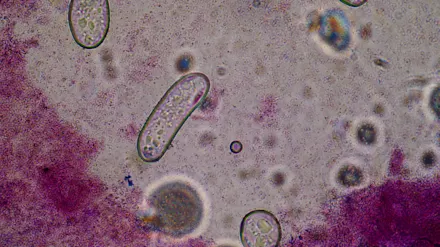
Health
Microbial map reveals countless hidden connections between our food, health, and planet
Researchers have mapped how microbes underpin healthy food systems—and how we can stop their decline.


Health
Researchers have mapped how microbes underpin healthy food systems—and how we can stop their decline.

Humanities
New methods make the ‘invisible visible’ to find evidence of deeply rooted cultural practice which otherwise might have been lost in the archaeological record

Featured news
Researchers analyzed data from 27,656 Americans between 23 and 43 years old in the ADD Health study. They found that participants reporting to have poor or worse hearing had significantly lower educational attainment, a lower probability of being in paid work, and earned less than their peers. These negative impacts of hearing loss were especially pronounced for Black and Hispanic Americans. Suffering from tinnitus was not found to have any effect on these outcomes. The authors propose better access to hearing care, early screening, and workplace support, as well as reducing stigma, to level the playing field for people with hearing loss.

Featured news
A study on savannah-living chimpanzees suggests the need to move safely on thin tree branches could explain why early hominins that could walk upright kept their tree-climbing adaptations.



Health
Researchers analyzed data from 27,656 Americans between 23 and 43 years old in the ADD Health study. They found that participants reporting to have poor or worse hearing had significantly lower educational attainment, a lower probability of being in paid work, and earned less than their peers. These negative impacts of hearing loss were especially pronounced for Black and Hispanic Americans. Suffering from tinnitus was not found to have any effect on these outcomes. The authors propose better access to hearing care, early screening, and workplace support, as well as reducing stigma, to level the playing field for people with hearing loss.

Health
Researchers have mapped how microbes underpin healthy food systems—and how we can stop their decline.

Health
Researchers followed 1,735 people in Denmark over 10 years after their loss of loved one. 6% participants showed unabatingly high levels of grief symptoms, and these had a 88% higher hazard rate of dying from any cause over the time period than those with persistently low symptoms. The first group were likewise more likely to use healthcare services, with 186% higher odds of receiving talk therapy or other mental health services, and between 160% and 463% higher odds of being prescribed psychotropic medication. This is the first study on the long-term mortality rate and the use of healthcare in a large-scale cohort of bereaved persons. The results suggest that patients at risk for long-term ‘high grief’ may be identified in advance, and need additional support from the healthcare system.

Health
Scientists have identified the human gene SDR42E1 as essential for the absorption of vitamin D from the intestine, its subsequent metabolic processing, as well as the production of lipids and steroids. Without the functional protein, the survival of cells dropped by 53%. This discovery has at least two potential applications in precision medicine. First, the experiments showed that the gene can be blocked to selectively kill cancer cells. Second, boosting SDR42E1’s expression could help treat many other diseases, for example, autoimmune and metabolic disorders, against which vitamin D and its related forms are thought to protect.

Neuroscience
In well-designed gardens, our gaze shifts quicker and more often. Researchers believe this could be key to understanding the relaxing effects gardens can have on viewers.

Neuroscience
A new model of brain metabolism – the most complex ever generated –shows how altering key chemicals could restore aged cells to their youthful activity and resilience.

Neuroscience
The auricular muscles, which helped our distant ancestors move their ears to improve hearing quality, activated when people were trying to listen to competing sounds.

Neuroscience
Scientists show that low-status male cichlid fish have higher levels of oxidative stress in their brain, which is linked to poorer mental and neurological health in humans.

Environment
Stable isotope analysis can tell apart ivory from mammoths dug up from the permafrost and modern elephants, closing a loophole for selling elephant ivory

Environment
Scientists studying the impact of solar power on local neighborhoods find that most people living close to large-scale solar plants wouldn’t mind if a new plant was built nearby.

Environment
First video footage shows impacts of anchor and chain damage caused by cruise, research, fishing, and private vessels on Antarctic sea floor and animals, highlighting critically understudied conservation issue.

Environment
In a new article published in Frontiers in Organizational Psychology, Daria Haner, Dr Yilei Wang, Dr Deniz Ones, Dr Stephan Dilchert, Dr Yagizhan Yazar, and Karn Kaura unveil surprising new findings: the world’s most sustainable businesses are the world’s most long-lived businesses, too. In this guest editorial, they explain their results, discuss the potential underlying reasons for their findings, and underline the importance of sustainability to the future of business.

Psychology
Physiological rhythms could explain why Italian university students were more likely to fail exams early or late in the day.

Psychology
Study participants asked to choose whether to empathize with or describe people preferred to empathize with groups, despite finding it difficult and distressing.

Psychology
A researcher put physical distance between people and their phones and found that our devices may not be the cause of our distraction – it’s what we do with them.

Psychology
Highly playful people are realistic about their circumstances, scientists say, but they are more resilient in the present and more optimistic about the future.

Space sciences and astronomy
Scientists successfully identify microbe fossils in terrestrial rocks like those found on Mars, opening up the possibility of searching for fossils on the Red Planet.

Space sciences and astronomy
Scientists explored microbial movement as a possible biosignature to detect life on Mars and beyond, cheaper and faster than ever before.

Space sciences and astronomy
Space belongs to no-one, yet many nations and private entities now plan to lay their claim on its resources. In a recent Frontiers in Space Technologies article, Nishith Mishra, Martina Elia Vitoloni and Dr Joseph Pelton shared their thoughts about how plans to exploit the ocean floors could impact the way resources from space are used and managed.

Space sciences and astronomy
Researchers found that astronauts’ processing speed, working memory, and attention slowed down, but a few months in space did not result in lasting cognitive impairment
Get the latest research updates, subscribe to our newsletter